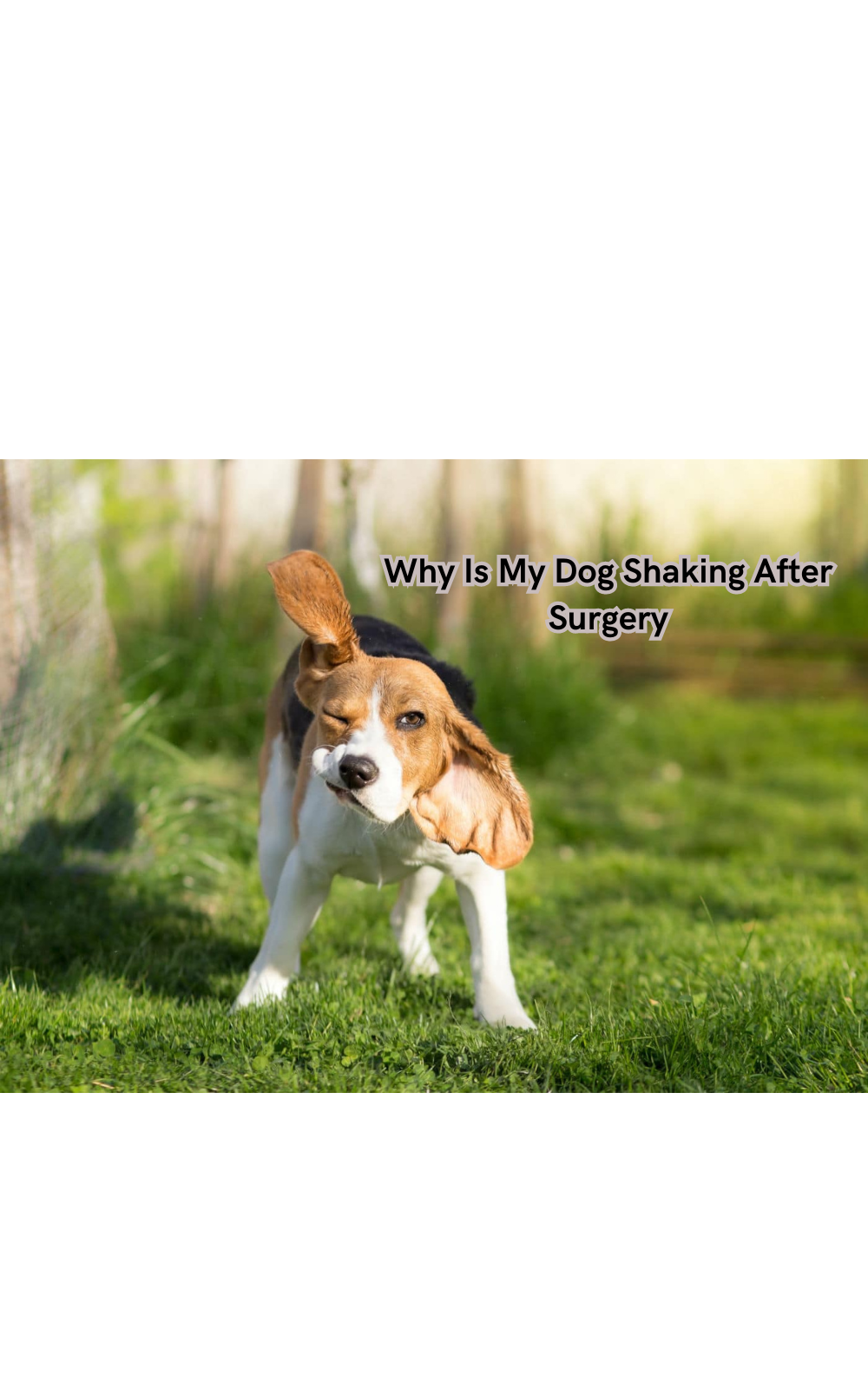Why Is My Dog Shaking After Surgery
Let's explore some common factors that contribute to post-surgery shaking in dogs and how to ensure a smooth recuperation for your beloved pet.

If you've noticed your dog shaking after surgery, it's natural to feel concerned. Postoperative shaking in dogs can cause worry, but it's essential to understand that it can be a regular part of recovery.
In many cases, shaking or shivering after surgery is a response to the anesthesia wearing off or to the body's attempt to regulate its temperature during the postoperative period. Understanding the reasons behind this behavior can reassure you and help you support your furry friend during their recovery.
Let's explore some common factors contributing to post-surgery shaking in dogs and how to ensure a smooth recovery for your beloved pet.
Understanding the Effects of Anesthesia
Anesthesia is a necessary part of any surgical procedure, and while it's safe for most dogs, it can still have some side effects. One of these side effects is shivering or shaking after surgery.
During the operation, your dog's body temperature may drop due to the effects of anesthesia on their nervous system. As a result, their muscles may contract involuntarily, causing them to shiver or shake. This response is completely normal and often subsides as the anesthesia wears off.
It's crucial to monitor your dog's temperature after surgery and keep them warm with blankets or a heating pad. If their body temperature drops too low, it can lead to other complications, so it's essential to seek veterinary attention if you notice any concerning changes in their temperature.
Possible Causes Why My Dog Is Shaking After Surgery
It's essential to know that shivering in dogs can have different causes, and not every case is a cause for concern. Occasionally, postoperative shaking will subside independently after a few hours or days. However, if the behavior persists or your dog shows other signs of distress, it's best to consult your veterinarian.
Here are some possible reasons why your dog may be shaking after surgery:
Pain and Discomfort:
Surgery can be a traumatic experience for dogs, and postoperative pain is a natural response to this trauma. If your dog's shaking or shivering seems more intense than usual, it could be a sign of discomfort or pain.
Some dogs may have a low tolerance for pain or have an underlying medical condition that makes them more sensitive to pain after surgery. A dog's pain after surgery can be managed with medication prescribed by the veterinarian.
Your veterinarian will prescribe pain control medication, and it's essential to administer these medications as directed. If you notice any changes in your dog's behavior or signs of increased pain, consult with your vet immediately. Ensuring your dog is comfortable during recovery is crucial for a successful healing.
Stress and Anxiety:
Just like humans, dogs can experience anxiety post-surgery. The unfamiliar environment of a veterinary clinic, the effects of anesthesia, and discomfort from the surgical procedure can all contribute to your dog's stress levels. Dogs may also pick up on their owner's emotions during this time, leading to increased anxiety.
Some signs of postoperative stress in dogs include shaking, panting, restlessness, and whining. To help your dog cope with stress and anxiety, provide a quiet and comfortable space to rest at home. You can also use calming techniques like massage or aromatherapy to soothe your furry friend and promote relaxation. Prescribe anti-anxiety medication to reduce the dog's stress levels in severe cases—anti-anxiety medication or sedatives to help your pet remain calm while they heal.
Infection or Other Complications:
While postoperative shivering is often a normal response to surgery, you must be aware of any changes in your dog's behavior or symptoms that may indicate an underlying issue. Shaking after surgery can signify an infection or other complications in rare cases.
If your dog's shaking is accompanied by fever, lethargy, loss of appetite, or any concerning discharge from their incision site, it's vital to seek veterinary attention immediately. Infections and other complications can delay the healing process and potentially lead to more severe health issues if left untreated. Remember, never give your dog human medications without consulting your veterinarian first.
These are a few common causes of postoperative shaking in dogs, but it's crucial to always consult with your veterinarian if you have any concerns about your dog's recovery.
How to Help Your Dog During Recovery
As a pet owner, seeing your furry friend in discomfort can be challenging after surgery. While postoperative shivering is usually nothing to worry about, there are some things you can do to help your dog feel more comfortable during their recovery.
Feeding Your Dog After Surgery:
Your veterinarian will provide specific instructions on when and how to feed your dog after surgery. In most cases, they'll recommend a bland diet that is easy for your dog to digest. Following these instructions carefully is crucial, as well as avoiding overfeeding your dog during this time.
Overeating can lead to nausea, vomiting, or other digestive issues that can further complicate their recovery. Regular store-bought food can cause the dog to vomit and get sick. Unlike humans, food does not make dogs feel better and recover faster.
Keeping Your Dog Calm and Comfortable:
Providing your dog with a calm and comfortable environment during their recovery is essential. Limit physical activity, restrict access to stairs or slippery surfaces, and set up a cozy spot for them to rest. You can also use soothing techniques like massage or gentle music to help your dog relax.
Manage post-surgery discomfort with prescribed pain medication and monitor the incision site for any signs of infection.
Follow-up Visits:
Your veterinarian will schedule follow-up visits to monitor your dog's recovery progress, remove stitches if needed, and address any concerns you may have. These visits ensure that your dog heals appropriately and regains strength after surgery. Don't hesitate to ask your veterinarian any questions or voice any concerns during these visits. Your active involvement in your dog's recovery can make all the difference in their healing process.
Monitor Your Dog's Incision Site:
Keeping a close eye on your dog's incision site during recovery is essential. Check for any signs of infection, such as redness, swelling, or discharge. If you notice anything concerning, contact your veterinarian immediately.
It's also crucial not to let your dog lick or chew at the incision site, as this can cause irritation and delay healing. Your veterinarian may provide an Elizabethan collar to prevent your dog from accessing the incision.
Restricting Your Pet's Movement:
Sometimes, your veterinarian may recommend restricting your dog's movement during recovery. This is especially true for procedures involving bones or joints. If this is the case for your dog, follow these instructions carefully and provide them with a comfortable space to rest and recover.
Crate rest may also be recommended to prevent your dog from engaging in strenuous activities that could delay healing.
Caring for Your Pet's Incision Site:
Your veterinarian will provide instructions on how to care for your dog's incision site after surgery. It's essential to follow these instructions carefully and keep the area clean and dry. If you notice any changes or concerns, contact your vet immediately.
Post-op instructions are crucial for a dog to recover successfully after surgery. Following these instructions and monitoring your dog's progress can help ensure a smooth recovery process for your furry friend.
But constitute medical advice is the only reliable source that can help determine what post-surgery care will benefit your dog's recovery.
Helping Tips for Your Pup to Stay Happy While Recovering
In addition to providing physical care, supporting your dog's emotional well-being is essential during their recovery. Here are a few tips to keep your pup happy while they heal:
- Be patient and understanding; your dog may be more irritable or lethargic than usual during this time.
- Provide plenty of love and attention; spending quality time with your dog can help relieve their stress and promote healing.
- Keep them mentally stimulated—provide puzzle toys or gentle training exercises to keep your dog's mind active while they rest.
- Follow a consistent routine; sticking to their regular schedule as much as possible can help them feel more secure and comfortable during recovery.
- Avoid introducing new changes; postpone significant changes, such as introducing a new pet or moving to a new home, until your dog fully recovers.
- Monitor their behavior. If you notice any concerning changes in your dog's behavior, such as increased aggression or anxiety, consult your veterinarian for advice on how to help them cope.
Follow these tips and provide your dog with the necessary physical and emotional care. A dog recovering post-surgery can be challenging, but with your love and support, your furry friend will return to their happy and healthy self in no time.
FAQs
What will I do if my dog is shaking?
If your dog is shaking after surgery, it could be due to pain, anxiety, or discomfort. It's essential to consult with your veterinarian for guidance on how to help your dog feel more comfortable and relaxed during their recovery.
Should I be worried if my dog is shivering?
It depends on the circumstances. If your dog is shivering due to being cold, providing them with a warm and comfortable environment is essential. However, if your dog is shivering uncontrollably or has other concerning symptoms, contact your veterinarian for advice on how to help your dog.
How do you calm a shaking and panting dog?
First, it's essential to identify the underlying cause of your dog's shaking and panting. If it's due to pain or discomfort, consult your veterinarian for proper medication and pain management techniques. If it's caused by anxiety, you can try soothing techniques such as massage, gentle music, or using calming aids like pheromone sprays.
Conclusion
The postoperative shaking observed in dogs can be attributed to various factors, with anesthesia and pain control medications being the primary contributors.
Pet owners need to understand that this shaking is often a temporary response as the effects of anesthesia wear off. Additionally, lowering body temperature, blood pressure, and heart rate due to anesthesia can lead to shaking or trembling in dogs post-surgery.
While it's natural to feel concerned about this behavior, mainly when observed weeks after the procedure, it's reassuring to know that it is not indicative of pain or cold in many cases.
Recognizing these reasons and providing the necessary care and comfort to the recovering pet can help ensure a smooth recuperation process and alleviate any undue worry for the pet owner.
